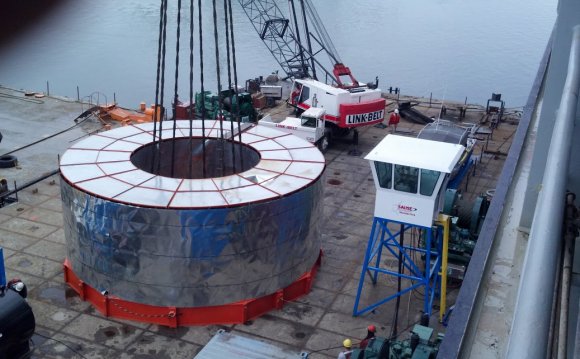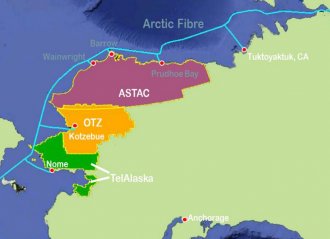
 The proposed network map for the the fiber optic cable. Image: Arctic Fibre.
The proposed network map for the the fiber optic cable. Image: Arctic Fibre.
A Canadian telecommunications company is implementing plans to lay a fiber optic cable from London to Tokyo by way of the U.S. and Canadian arctic, and is readying summer marine surveys to map exactly where it will lay the cable.
When complete, several spurs off the main fiber line could mean high-speed broadband internet for many communities in northwest Alaska.
is the company building the fiber backbone. Anchorage-based is the “middle mile” provider in Alaska who will link the fiber optic pipeline to local telecommunications providers in Nome, Kotzebue, and other communities in the Bering Strait and along the North Slope.
Despite international complexity and an approximate $650 million price tag, Quintillion CEO Elizabeth Pierce said during a visit to Nome this week that the project is far enough along for marine surveys to start this summer, “which is actually ships in the water using sonar and video to map the whole route of the cable, ” she said.
“The cable will be built this winter to exactly match that route, ” she added, with a timeline of laying the fiber in the arctic by summer 2015.
Pierce’s presentation highlighted the sonar equipment Quintillion and Arctic Fibre intend to use in its surveying this summer. The company’s presentation showed the equipment to be similar to what some oil companies use in their undersea mapping process. While the risks mentioned in Quintillion’s presentation in Nome discussed issues that could negatively impact the fiber project, the company did not note what, if any, impact the sonar surveys and eventual subsea construction work could have on arctic ecosystems. The report also made no mention of potential impact on subsistence species.
Quintillion may be providing the “middle mile” capacity, but it’s up to “final mile” telecom companies to bring the broadband into Alaska homes. In North Slope communities like Barrow and Point Hope, that work is being done by the Arctic Slope Telephone Association Cooperative; in Kotzebue, by OTZ Telephone Cooperative, Inc. In Nome, it will be done by TelAlaska.
“We’re pretty much ready to bring in that capacity, ” TelAlaska CEO Brenda Shepard said. “We’re just as anxious as everybody else is to see this happen, ” she laughed.
TelAlaska will take control of one of several spurs shooting off the main fiber line. Though Shepard wouldn’t say how much consumers will pay for the broadband service once it makes it to Nome, she said it could be available within two years.
“That cable will actually feed into our central office, where we will then be able to distribute that capacity into the community, ” Shepard said. “First quarter of 2016 is when we should actually be able to turn it up.”
Pierce said the spurs connecting Nome and other Alaska communities into the high-speed fiber line are an offshoot of high international demand for the cable. Ultimately, she said selling internet access for homes in rural Alaska will only be a small part of what makes the project profitable.
“There is certainly going to be growing demand in the arctic in terms of homeland security and defense activities, ” Pierce said. “There’s opportunities to balance environmental protection and resource development, especially oil and gas. So there’s certainly demand in the commercial sector.”
Pierce added the project is coming to market almost entirely through private investment, with no federal or state assistance. At least one investor, Futaris, Inc., a subsidiary of Alaska Native corporation Calista Corp., has announced its involvement publicly.
YOU MIGHT ALSO LIKE












